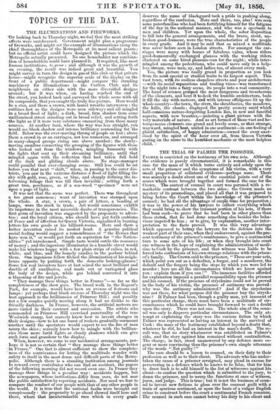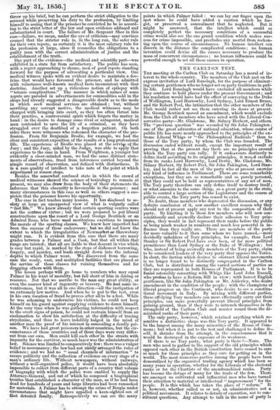THE TRIAL OF PALMER THE POISONER.
PALMER is convicted on the testimony of his own acts. Although the evidence is purely circumstantial, it is remarkable in this case for the mass of it which turns entirely and solely upon the acts of the prisoner and the symptoms of his victim, with a very small proportion of collateral evidence—perhaps none. There was scarcely a doubt about one of the essential points out of the scores which were brought together and formed the case for the Crown. The contest of counsel in court was pursued with a re- markable contrast between the two sides : the Crown made no mystery of its proceedings, and placed all that it was prepared to bring before the Court within the knowledge of the prisoner's counsel ; he had all the advantage of ample time for preparation ; it was in the power of his lawyers to collect everything which they could bring to show the innocent portion of his acts, if there had been such—to prove that he had been in other places than those stated, that he had done something else besides the beha- viour imputed to him ; or to give, by explanation, another inter- pretation to the facts proved. It was this very advantage which appeared to betray the lawyers for the defence into the weakest part of their case, when they endeavoured., against the pre- sent testimony of the prisoner's countenance to give a sentimental turn to some acts of his life; . or -when they brought into court one witness in the hope of explaining the administration of medi- cine to Cook by the prisoner, and that witness was liable to be forced into confessions of his own strange relations with the prison- er's family. The Crown said to the prisoner, "These are your acts, which point you out as a defaulter, a forger, and. a murderer, the default and the forgery being the steps by which you were led. to murder ; here are all the circumstances which we know against you : explain them if you can ! " The immense facilities afforded for explanation imposed a parallel responsibility upon the prisoner and his counsel. It the presence of strychnine could not be proved in the body of his victim, the presence of antimony was proved: why was the antimony administered? And if the strychnine was not there, for what purpose did the prisoner buy the strych- nine? If Palmer had been, though a guilty man, yet innocent of this particular charge, there must have been a multitude of cir- cumstances which he could have brought forward to cast a doubt upon the story. There was not one. The whole aim of the coun- sel was only to disprove particular circumstances. The only at- tempt at explaining the storywas the curious fiction by which Palmer was represented as having an interest in the survival of Cook : the mass of the testimony established 'beyond a doubt that, whatever he did, he had an interest in the man's death. The re- sult was, that no story whatsoever was established on Palmer's side, and the story against him remained without contradiction. The charge, in fact, stood unanswered by any defence more co- gent or more convincing than the prisoner's own simple utterance of the words "Not guilty ! " The case should. be a lesson to counsel, on their duty to their profession as well as to their client. The advocate who has under- taken the cause of a prisoner arraigned, may plead in excuse for persevering in a defence which he knows to be false, that for him to draw back is to add. himself to the list of witnesses -against his client—to confess the question which is submitted to the jury, to damn the prisoner, and to usurp the functions at once of witness, juror' and judge. This is true ; but it i not the business of coun- sel to invent new fictions to gloss over the coarsest guilt with a train of spurious sentiment, or upon the basis of a vulgar English crime to construct before the court a sentimental French romance. The counsel in ouch case cannot betray his duty to his client and throw up his brief, but he can perform the strict obligation to the accused while preserving his duty to the profession, by limiting himself to seeing that if the prisoner be convicted he be so accord- ing to the strict letter of the law and upon evidence adduced and substantiated in court. The failure of Mr. Sergeant Shee in this case—failure, we mean under the eye of criticism—may convince counsel that the stricter rule is, in the long run the safer rule for their own repute, as certainly it is the most salutary rule for the profession at large, since it reconciles the obligations to a guilty _man with the correct administration of justice and the establishment of the truth.
One part of the evidence—the medical and scientific.part—was exhibited in a state far from satisfactory. The public has seen, with a regret approaching to shame men of good repute standing forward for the purpose of advocating a particular view. One medical witness spoke with an evident desire to maintain a doc- trine that would have favoured the prisoner, and he admitted with reluctance well-known medical facts inconsistent with that doctrine. Another set up a ridiculous notion of epilepsy with " tetanic complications." The manner in which names of some repute are paraded in advertisements for commodities sold, in the shops had already suggested a disagreeable doubt as to the mode in which such medical services are obtained ; but, without ascribing any corrupt motive, the medical witnesses may be charged with bringing into court, as they too often thrust into their practice, a controversial spirit which forgets the matter in hand: in the desire to damage some rival or antagonist, medical men. contended to save the life of a criminal, as they have struggled over the deathbed of a forgotten patient. On both sides there were witnesses who redeemed the character of the pro- fession. From Sir Benjamin Brodie, for example, we had the -clear and consistent exposition of the results of a long professional slife. The experience of Brodie was laced at the servile of the Jury; and the Jury, aided by the Judge, was able to apply that experience to the case in hand. From Wrightson, a younger but evidently a clear-minded man' we had the same distinct state- ments of observations, freed from inferences carried beyond the simple record of observation, and defined with distinctness. It is a rare quality of intellect to take note of the point at which experiment or reason stops.
Besides the somewhat confused state in Which the crowd of medical witnesses showed the science of toxicology to remain at present, we may also draw from the body of their statements the inference that this obscurity is favourable to the poisoner ; and many circumstances in this case as well as others suggest a sus- picion that the poisoner knows his opportunity.
The ease in fact teaches many lessons. It has disclosed to so- ciety at large an unexpected view of what is vulgarly called "fast life." We knew already that certain sporting centres were not the centres of virtue ; but we were prepared to put liberal constructions upon the resort of a Lord George Bentinck or an Admiral Rous' who have used meritorious exertions to improve the morale of the sporting classes. We knew how imperfect had been the success of these endeavours ; but we did not know the extent to which the irregularities of Newmarket or Shrewsbury might run. It is evident from this ease that there are many grades between a Palmer and a Cook, but that all within that range are tainted; that all are liable to that descent in vice which is easy but rapid, is marked by the steps of dishonest borrowing, forgery, and murder, and leads straight down into the infernal depths to which Palmer went. We discovered from the same case the ready, vast, and multiplied facilities that are placed at the service of those classes for ruining themselves and for dragging others with them.
The lesson perhaps will go home to numbers who may equal Palmer in his want of morality, but fall short of him in daring or resource. Not that we ascribe to the man any great ability, or even the coarser kind of ingenuity or bravery. He had some in- ventiveness, but it was all in one direction—all the instigation of an extremely low motive. And when he is put to the test, even in his own vocation of fraud he proves after all to be a fool. While he was scheming to undermine his victims, he could not keep - himself on his guard against supplying evidence to damn himself. At the very time when he was gathering information with respect to the overt signs of poison, he could not restrain himself from an
• exclamation to show his satisfaction at the difficulty of tracing strychnine, and thus to leave indelibly lodged in the mind of another man the proof of his interest in concealing a deadly poi- son. We have had great poisoners in other countries, but the cir- cumstances of those countries and of those flays were very differ- ent from our own. Men could kill each other in the streets with impunity for the survivor, so much taxer was the administration of law. Science was limited comparatively few; there was a vulgar belief in necromancy; the law had not nicely arranged the rules of evidence • and we had no "usual channels of information" to . secure publicity and the collection of evidence on every stage of a man's ordinary life. Without newspapers, without railways, 'without a well-organized police, it would have been absolutely impossible to collect from different parts of a country that volume of biography with which the police were enabled to supply the Attorney-General, and out of which he composed a biographical treatise that established a character of the man as if he had been dead for hundreds of years and large libraries had been ransacked for materials. A Palmer has to attempt the crime of Borgia under circumstances that might have appalled a keen-sighted son of that detested family. Retrospectively we. can see the many points in which Palmer failed : we can lay our finger upon the spot where he could have added a caution which he for- got, or preserved a concealment that he neglected. But it might be answered, that the intellect which could so completely perfect the necessary conditions of a successful crime would also see the one grand condition which makes suc- cess for crime impossible, and precludes any mortal from reckon- ing upon the course of circumstances. No human intellect can discern in the distance the complicated conditions ; no human invention could devise all the causes necessary to produce the mass of concurrent circumstances ; no human influences could be powerful enough to set all these causes in operation.



























 Previous page
Previous page